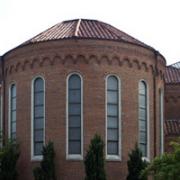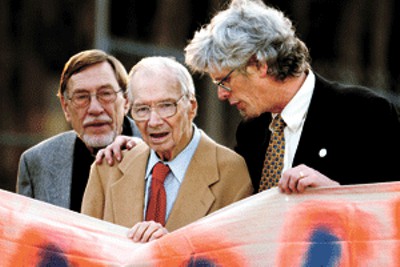Difference between revisions of "Pullen Memorial Baptist Church of Raleigh"
| Line 17: | Line 17: | ||
== '''II. Pullen Church 1982-1991''' == | == '''II. Pullen Church 1982-1991''' == | ||
| − | In the mid-1980s under the leadership of progressive pastor Mahvin | + | In the mid-1980s under the leadership of progressive pastor Mahvin Siler, Pullen began the process of using inclusive language in their worship which include using gender-neutral language in scripture, song, worship, and using feminine, masucline, and gender-neutral images while referring to God and humanity. This was done in order to bring to light the complementary male and female metaphors of the Bible and to expand the view of God and God's people. <ref>http://www.pullen.org/page/worship-traditions </ref> |
[[File:Bible.jpg]] | [[File:Bible.jpg]] | ||
| Line 23: | Line 23: | ||
== '''III. Pullen Church 1991-Present''' == | == '''III. Pullen Church 1991-Present''' == | ||
| − | Pullen's reputation as a liberal, welcoming church continued inthe 1990s | + | Pullen's reputation as a liberal, welcoming church continued inthe 1990s under Siler |
Revision as of 22:27, 18 April 2012
Pullen Memorial Baptist Church is a 700-member [1] Baptist church located at 1801 Hillsborough Street in Raleigh, North Carolina. Pullen was established in May 1884 as a mission of First Baptist Church of Raleigh and later organized as "Fayetteville Street Baptist Church" on December 28, 1884. After the death of its lay leader John T. Pullen in the spring of 1913, the congregation voted to rename themselves "Pullen Memorial Baptist Church"[2] Pullen has a long reputation of a church with a progressive leadership and congregation [3] during the Civil Rights Movement, Pullen was known as a safe haven for discourse between the races. The congregation was known to take up civil rights issues within the church and on the streets of North Carolina [4]
Pullen is affiliated with American Baptist Churches USA [5] and The Association of Welcoming and Affirming Baptists [6]
I. Pullen Church 1884-1982
Pullen Baptist Church began as a mission of the First Baptist Church of Raleigh in May 1884, later organized as Fayetteville Street Baptist Church (after Fayetteville Street in Raleigh, North Carolina) on December 28, 1884. The church was lead by strong lay leadership (in the absence of a pastor) including John T. Pullen until his death in May of 1913, upon Pullen's death the congregation decided to rename themselves "Pullen Memorial Baptist Church" in honor of Pullen who dedicated himself to the church. Pullen went through a time of instability of pastor leadership until J.A Ellis assumed the role of pastor in August of 1919, beginning the history of Pullen's tackling of "controversial social issues." [7] Pullen approved the election of women as deacon in 1927, 8 years after women's suffrage, which was frowned upon by many other Baptist congregations in the area who believed the man to be the spiritual head of the household and church. J.A. Ellis left Pullen in 1929 for First Baptist Church of Sherman, Texas where he continued social work (including improving race relations) in the deep South. [8] Another social reformer took the helm of Pullen in 1929, E. McNeill Poteat Jr. began as pastor of Pullen in September of 1929 following the departure of J.A. Ellis. As pastor of Pullen Poteat helped form the North Carolina Council of Churches in 1935 which forged connections between Christian denominations across the state. [9] Upon the death of Poteat in in 1956 W.W. Finlator became the head pastor of Pullen in July, 1956. Finaltor believed that the pastor should "preach with one hand on the Bible and a newspaper in the other" throughout his time at Pullen he solidified the churches reputation as a "liberal" church by fighting segregation, poverty, capital punishment and war. Finaltor was a standout among his white counterparts, prior to the Civil Rights Movement Finaltor spoke out from the pulpit and the street against segregation. He was also a proponent of women's rights, nuclear disarmament, and one of the first religious leaders to embrace the idea of gay rights (See picture below, Image courtesy of IndyWeek.com) [10] Finlator was also intergal in the affirming of all people regardless of race into membership of Pullen and full membership of Christians who transferred membership from different denominations. This almost resulted in Pullen's ouster from the Baptist State Convention. Pullen joined the American Baptist Churches, USA in 1967. Finlator was forced to retire from Pullen in 1982 because his progressive views had exceeded those of his congregation. [11]
II. Pullen Church 1982-1991
In the mid-1980s under the leadership of progressive pastor Mahvin Siler, Pullen began the process of using inclusive language in their worship which include using gender-neutral language in scripture, song, worship, and using feminine, masucline, and gender-neutral images while referring to God and humanity. This was done in order to bring to light the complementary male and female metaphors of the Bible and to expand the view of God and God's people. [12]
III. Pullen Church 1991-Present
Pullen's reputation as a liberal, welcoming church continued inthe 1990s under Siler
- ↑ http://www.pullen.org/page/faqs
- ↑ http://www.pullen.org/page/history
- ↑ http://www.indyweek.com/indyweek/best-of-the-triangle-2006-morning/Content?oid=1197837
- ↑ http://www.wral.com/news/local/story/138401/
- ↑ www.abc-usa.org
- ↑ http://www.awab.org/member-congregations.html
- ↑ http://www.pullen.org/page/history
- ↑ http://www.fbcsherman.org/content.cfm?id=307
- ↑ http://www.nccouncilofchurches.org/about/
- ↑ http://www.abpnews.com/content/view/1420/119/
- ↑ http://www.abpnews.com/content/view/1420/119/
- ↑ http://www.pullen.org/page/worship-traditions


